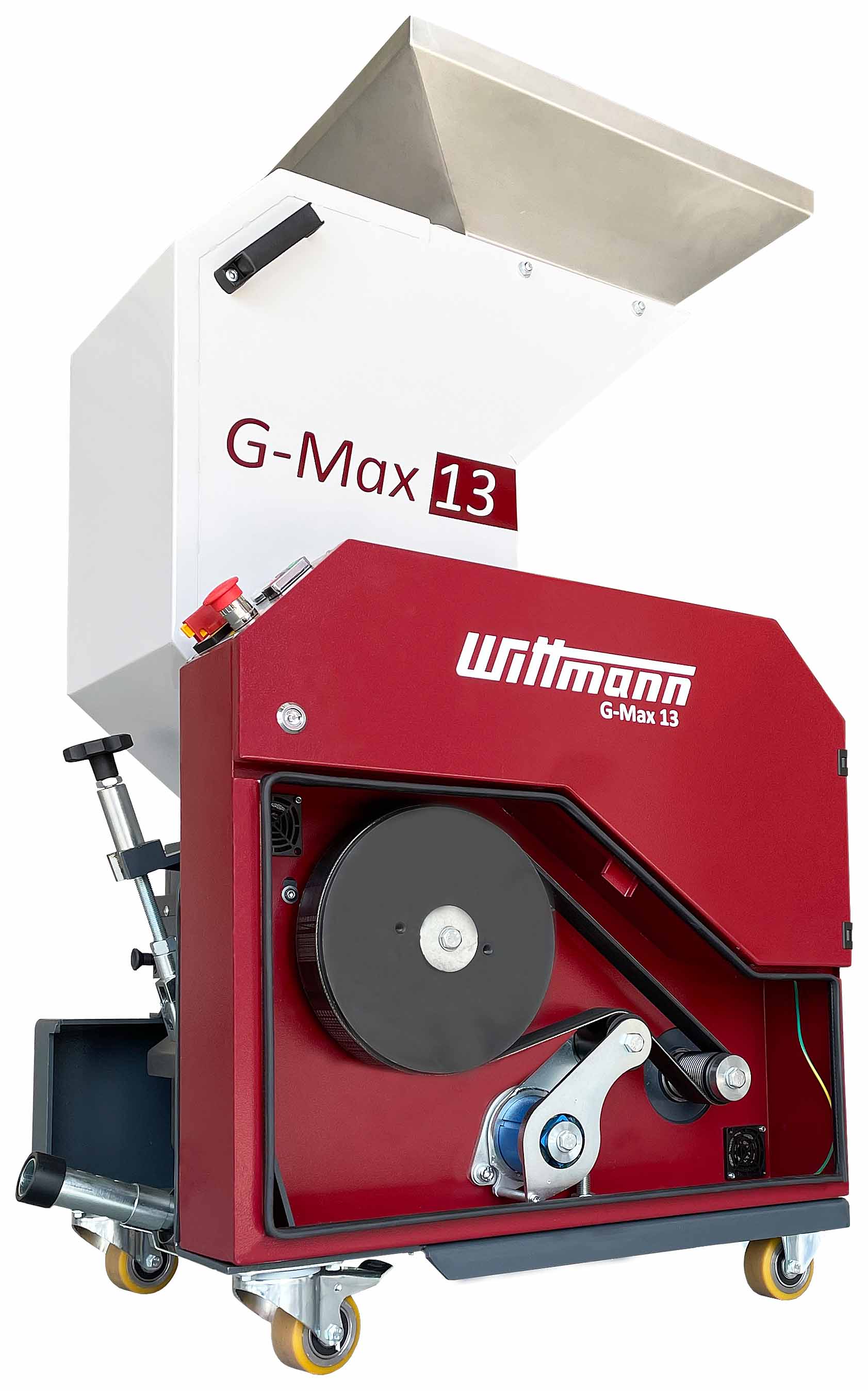
Plastic sprues are typically composed of clean production scrap and can therefore be easily reused. The G-Max series of compact beside-the-press granulators is specifically designed for closed-loop material recycling of sprues/runners that are discharged from injection molding machines up to 500 tons clamping force. The WITTMANN G-Max series packs a lot of smart engineering into a very compact footprint in order to operate quietly and efficiently, grinding soft to medium-hard plastic sprues and defective parts.
Belt drive with automatic tensioning system: absolutely maintenance-free
The granulators of the G-Max series are driven by a Poly-V belt transmission. Self-pre-tensioning belt drives ensure much more adaptability to all applications when grinding sprues and runners. The high torque of the rotor and a solid flywheel provide more cutting power for smooth, steady, and reliable operation when processing parts with cross-sectional thickness.
The Poly-V drive is the best solution for protecting the motor when overload conditions occur, and it provides excellent cushioning when the granulator is in start-up mode. The belt drive absorbs stress and vibration during operation, thus reducing wear and preventing damage – an essential advantage when compared to a gear box and a gear motor. In addition, the belt and pulley operation is much quieter than a gear-based motor.
The belt drive is a maintenance-free system and provides high energy efficiency, ensuring the highest quality of the finished product at low operating costs. Downtime caused by preventive maintenance and the need to adjust the belt tension are completely eliminated.
A worn or loose belt can decrease cutting efficiency, and belt slippage can also lead to frequent granulator jams and can increase energy consumption. Regular checks on conventional belt drives are necessary in order to guarantee continuing and proper energy transmission from the motor to the rotor. WITTMANN’s choice of solid rotor pulleys leads to a very cost-effective solution, achieving better cutting force without adding motor power.
And for small beside-the-press granulators, only WITTMANN is able to offer a belt drive with an automatic tensioning system.
The WITTMANN Group
The WITTMANN Group is a globally leading manufacturer of injection molding machines, robots and auxiliary equipment for processing a great variety of plasticizable materials – both plastic and non-plastic. The group of companies has its headquarters in Vienna, Austria and consists of two main divisions: WITTMANN BATTENFELD and WITTMANN. Following the principles of environmental protection, conservation of resources and circular economy, the WITTMANN Group engages in state-of-the-art process technology for maximum energy efficiency in injection molding, and in processing standard materials and materials with a high content of recyclates and renewable raw materials. The products of the WITTMANN Group are designed for horizontal and vertical integration into a Smart Factory and can be interlinked to form an intelligent production cell.
The companies of the group jointly operate eight production plants in five countries, and the additional sales companies at their 34 different locations are present in all major industrial markets around the world.
WITTMANN BATTENFELD pursues the continued strengthening of its market position as a manufacturer of injection molding machines and supplier of comprehensive modern machine technology in modular design. The product range of WITTMANN includes robots and automation systems, material handling systems, dryers, gravimetric and volumetric blenders, granulators, temperature controllers and chillers. The combination of the individual areas under the umbrella of the WITTMANN Group enables perfect integration – to the advantage of injection molding processors with an increasing demand for seamless interlocking of processing machines, automation and auxiliaries.
Source: fortuna.gr